



 |
 |
 |
 |
Ed: Upon finally reviewing these albums myself, I suspect Brian's got the odd 'Tron track wrong, but I'm not going to ask him to rewrite it now...
Those awfully nice people at EMI recently re-issued the first four Barclay James Harvest albums, re-mastered and very nicely repackaged, with some trendy artwork by the King of re-issue art, Phil Smee. Each of the four mid-price CDs has a plethora of bonus tracks, many previously unreleased, and any fan of progressive rock and the glorious sound of the Mellotron would be more than pleased with EMI's decision to put out these classic albums. Why, oh why, they can't do the same with The Beatles back-catalogue is beyond me. They'd sell billions and probably get themselves out of the financial poo in the process. But I digress; let's get on with our story of four northern lads called John, Mel, Les and Woolly. For a full biography, discography and all the other ographies, I thoroughly recommend that you take a trip to www.bjharvest.co.uk, or if you can't be bothered, sit down, relax and read on. Are you sitting comfortably? Then we'll begin...
Oldham. Cloth-caps, black pudding, Hovis, and Friday nights down the pub, grooving to local talent like The Keepers and The Wickeds. It was these embryonic beat combos that begat the four young men that became BJH. John Lees, Richard Leslie Holroyd, Melvyn Paul Pritchard and Stuart John Wolstenholme probably didn't wear cloth-caps and were more likely to eat Mothers Pride than Hovis. In 1966 the various members of the aforementioned Keepers and Wickeds merged to become the six-piece The Blues Keepers. Musically differing members departed and those that were left put little bits of paper in a hat and pulled out the name Barclay James Harvest.
They were soon discovered by John Crowther, an Oldham boutique owner, who put his faith in the boys and their woolly jumpers, and ensconced them in a 16th century dump called Preston House in the village of Diggle. It was there, high on the windy moor, that they made their music and black pudding sandwiches. Oh! And Stuart became Woolly, Richard became Les, Melvyn became Mel and John Lees wore eye-shadow.
In the summer of 1967 they debuted their songs in Manchester. Their early attempts at re-writing musical history involved the use of instruments such as the cello and recorder, but they soon decided, after hearing the likes of The Moody Blues, that a beast called a Mellotron was needed. They tracked one down in Derby, and rented it from a man who later decided that he didn't want it back. They are strange people in Derby, so beware!
BJH's reputation grew locally and soon Granada Television, the creators of Coronation Street, made a short feature about the boys and their life in Diggle. The film included demos of two songs, Early Morning and Mr. Sunshine, and shortly after this TV exposure the friendly boutique owner took the lads south to the city of London. It was that session in Chappell Studios that led to EMI releasing BJH's first single on Parlophone. Which brings us to the first CD re-issue...
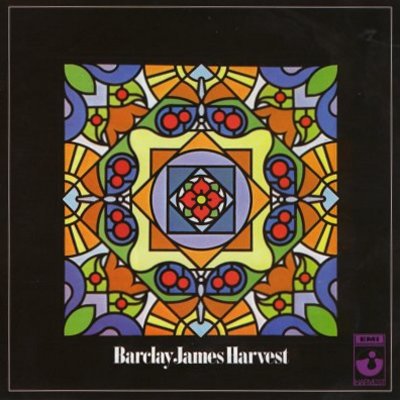 |
Taking Some Time on Mother Dear The Sun Will Never Shine When the World Was Woken Good Love Child The Iron Maiden Dark Now My Sky Early Morning* (single A-side) Mr. Sunshine* (B-side of above) So Tomorrow** (BBC session 20/04/68) Eden Unobtainable** (BBC session 20/04/68) Night** (BBC session 30/07/68) Pools of Blue** (BBC session 30/07/68) Need You Oh So Bad** (BBC session 30/07/68) Small Time Town** (BBC session 30/07/68) Dark Now My Sky** (BBC session 30/07/68) I Can't Go on Without You* (Chappell Studios session) Eden Unobtainable* (Chappell Studios session) Poor Wages* (single B-side) Brother Thrush* (A-side of above) * Indicates CD bonus tracks ** Indicates previously unreleased track |
There are 13 bonus tracks here and we'll deal with those first, as I like to do things chronologically.
Early Morning has a nice flute introduction that reminds me of a very old TV ad for Cadbury's Flake, strings come in very shortly after and stay there throughout. It's a gentle ballad, reminiscent of The Moody Blues. The B-side, Mr. Sunshine, is a bit twee, but nice. No Mellotron but some pleasant recorder from John Lees. John Peel quickly picked up the single, and this led to a session on 'Top Gear'. Two songs were recorded for their first national broadcast on 20th April 1968. So Tomorrow is typical of the time and could really be anybody. Eden Unobtainable kicks off with some upfront strings, which drop out every now and again. Another ballad, the anoraks amongst you will spot a Mellotron line later used in the epic Moonwater. After appearing in the Daily Mail where Woolly told the world that "We restrict ourselves to 12s 6d (that's 62½ new pence by my reckoning) a week... and don't go out". How many woolly jumpers could you buy for that much in 1968?
The lads were recalled to the Beeb for another session broadcast on 30th July. Night doesn't sound like them, an up-tempo little number but 'Tron-less. Pools Of Blue (which the boys offered to EMI for the next single) starts with strings that disappear until the chorus. I would have released it, it's brilliant! Need You Oh So Bad is a folky ditty featuring recorder and cello. Sounds like Leonard Cohen to me! Small Time Town isn't up to much really and you don't get any 'Tron until the la-la-la bits. Dark Now My Sky is totally unlike the album version. The verses are the same, but that's about it. No orchestra, just mostly acoustic guitar and organ. Another session at Chappell Studios, where Pools Of Blue originated, also produced I Can't Go On Without You and another Eden Unobtainable. The former is a gentle song with piano and accordion, whilst the latter is almost exactly the same as the BBC version, except it's been tuned up a tone, and has improved sound quality for those of you with ears. The band weren't happy with the session and neither were EMI until they released a double CD in 1991 called The Harvest Years. (More about that later).
Radio listeners across the nation cried "Yeah man! We want BJH!" So the boys ventured south yet again and performed their first London gig at the legendary Roundhouse on September 13th 1968. Another London engagement in November introduced BJH to the Blackhill Agency and vice versa. Dotted lines were signed upon and this got the woolly-clad foursome onto the University and College circuit.
It was at another Roundhouse gig that Robert John Godfrey (yes, him!) introduced himself to the band, eager to create a fusion between a symphony orchestra and a rock band. Taken on as an arranger, Robert John planted the seed in the boys' minds to grow their own special blend of symphonic, progressive rock.
And thus EMI created Harvest. Apparently the naming of the label had nothing to do with the last word of the band's name, some disagree but I don't really care. Harvest was the playground for many fine artists from the late sixties onwards, and one of the earliest Harvest singles was Brother Thrush/Poor Wages. The B-side is a rocker with some thrashing tambourine and lovely guitar work whilst the A-side is a quaint little tune about a thrush, featuring some very high voices. Neither feature Mellotron. The single failed to hit the pop charts but EMI felt that, in the grand young tradition of progressive rock, an album was due.
Recording began in November 1969 at Abbey Road with Norman "Hurricane" Smith at the controls. Barclay James Harvest, for that was the album's title, arrived in the shops on June 5th 1970. Taking Some Time On starts the album with a yee-har sort of guitar riff. It's a good up-beat start to the album, and with James Litherland from Colosseum also playing guitar it sounds really chunky. Mother Dear, on the other hand, is an airy folksy tune with an orchestral arrangement from Norman Smith. Very pleasant. The Sun Will Never Shine begins with a gentle Mellotron introduction and the strings setting is kept on all the way through this anthemic number. Lees' guitar work reminds me of Justin Hayward, but then, one can never escape the comparisons with The Moody Blues. When The World Was Woken continues in a similar vein with organ work suggestive of Procol Harum. But it's Robert John Godfrey's arrangement that makes this a standout track. It's simply perfect with a hint of the old Anglia Television theme tune. Good Love Child is the complete opposite with a tight little Beatle-ish sound. Rock and roll! The Iron Maiden is a romantic medieval-like song about a girl nicknamed Behemoth (the mind boggles!) that Woolly once knew, with flute and strings from the Mellotron. The final track of the original album, Dark Now My Sky, is an epic in its own lifetime. Woolly donned cape and artificial hump for the spoken introduction à la Lawrence Olivier, though he reminds me more of Peter Sellers. Followed by a short burst of cackling from Robert John, whose arrangement perfectly complements the band bashing away on piano and drums along with that John Lees guitar sound, we eventually arrive at the almost whispered first verse. Several more minutes of pomp, bombast and everything else that RJG could fit in and that's it. The end of the first album.
The album was promoted on a brief tour with The Barclay James Harvest Symphony Orchestra with Robert John conducting. Dates included The Royal Albert Hall and Manchester Free Trade Hall. In August, Harvest released an edited version of Taking Some Time On with The Iron Maiden on the flip-side. A happy time was guaranteed for all and plans were afoot for a follow-up album.
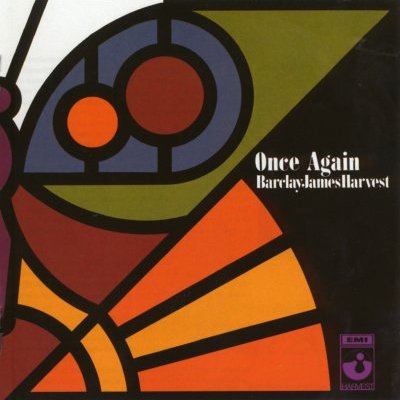 |
She Said Happy Old World Song for Dying Galadriel Mocking Bird Vanessa Simmons Ball and Chain Lady Loves Introduction - White Sails (a Seascape)** Too Much on Your Plate** Happy Old World* (Quadraphonic mix) Vanessa Simmons* (Quadraphonic mix) Ball and Chain* (Quadraphonic mix) * Indicates CD bonus tracks ** Indicates previously unreleased track |
Once again (get it?) our intrepid heroes hit the road for a tour of North England, but without the financially crippling orchestra, and in October 1970 they were back at Abbey Road with Hurricane Higgins. Sorry, I mean Norman Smith.
The album begins with She Said and full-on Mellotron. No messing about this time, with a slow tempo and vengeful playing. The Lees guitar sound is to the fore. The power lets ups in the middle for a nice little recorder bit that could have been written by Henry VIII. Happy Old World starts with an atonal rumble but then enters a dreamy world with some very distant strings. The sing-a-long chorus has a nice Hammond sound and there's some nice vibe sounds as well. Song For Dying is one of those anti-war things. This is classic BJH. Only the chorus has strings, but along with that guitar sound, it's just beautiful. There are loads of strings over the repetitive vocal refrain towards the end that dwindles away to almost nothing. And then, Galadriel. A tender song, which John introduces on Lennon's 'roof top' Epiphone, with only a hint of Mellotron strings before Robert John Godfrey's arrangement enters. Mocking Bird follows and this really is the band's Stairway To Heaven. An unforgettable melody and orchestral arrangement carries us along until all hell breaks loose with Robert John's score and that guitar sound, and when it does it sends shivers up your spine. It all dies down and eventually fades away into the background. Vanessa Simmons is another harmless ballad, which is nice... Ball And Chain is a plodding rocker which reminds me ever so slightly of Steppenwolf's The Pusher. The last track of the original album is the mid-tempo Lady Loves, which has the infamous Alan Parsons on Jews' Harp.
The short introduction piece, White Sails, was recorded during the album sessions and although performed live in the summer it never reached vinyl. A sort of precursor to Moonwater, it's one of Woolly's orchestrated by RJG. The Crosby, Stills & Nash meets Led Zeppelin track, Too Much On Your Plate, also dates from that session, and it's an absolute crime that it wasn't on the album. It's a proper rocker with shades of the above mentioned, but also a smidgeon of The Grateful Dead as well. I love it! The CD reissue comes to a close with three tracks from the Quad mix of Once Again released in 1973. There are vocals and instruments here left out of the stereo mix, but otherwise nothing new.
You may have noticed by now that I keep referring to that guitar sound here and there in my text. Well... let's just say that John Lees' stinging electric lead sound wasn't everybody's pint of cookin'. Bee-like at times, it can get on one's nerves. But it does fit in quite well with the rest of the band, especially the Mellotron or orchestral crescendos.
Summer 1971, and Robert John Godfrey departed for a solo album and later, The Enid. Martyn Ford rode into town and with a change of management as well, the stage was set for third long-player.
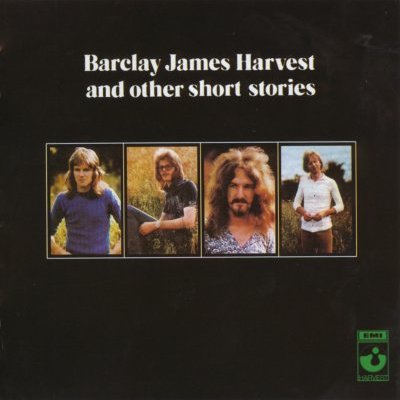 |
Medicine Man Someone There You Know Harry's Song Ursula (The Swansea Song) Little Lapwing Song With No Meaning Blue John's Blues The Poet After the Day Brave New World (Demo)** She Said (BBC session 05/07/71)** Galadriel (BBC session 05/07/71)** Ursula (The Swansea Song) (BBC session 05/07/71)** Someone There You Know (BBC session 05/07/71)** Medicine Man (BBC session 15/03/72)** * Indicates CD bonus tracks ** Indicates previously unreleased tracks |
Prior to recording their third album, BJH were once again the subject of a BBC session. She Said and Galadriel (this time with no orchestra) were put onto tape along with a couple of newly penned tunes. The two oldies from Once Again are both very good, if not slightly more revealing renditions, especially the band's transition of RGJ's arrangement on Galadriel. The first new one, Ursula (The Swansea Song), is in a similar vein to Vanessa Simmons with some nice strings. The second new one is Someone There You Know and is very much like Ursula. Although broadcast in mono, these are stereo mixes. Hoorah!
On July 5th 1971 the album sessions began under the watchful fingers of Wally Allen. The LP kicks off with Medicine Man. Martyn Ford and Toni Cooke's orchestral arrangement tends to overshadow the band's playing but it's still a powerful song and has remained a classic ever since, although John Lee's pronunciation of the word calliope pisses me off every time. Someone There You Know is obviously a more polished version this time around with a bit more oomph to it, with John Lees going berserk here and there. Harry's Song is about a parrot that Lees owned that passed away. Some effective multi-tracked lead guitar spurts, and joanna bashing. Ursula (The Swansea Song) has a lot more Mellotron then the earlier Beeb version, with a nice bit of flute at the beginning. The chorus is simply blissful. There's another bird song next in the form of Little Lapwing. Les Holroyd plays nearly everything himself on the track. After a gentle song section, Ford's arrangement comes in with a touch of Nelson Riddle before it fades. Song With No Meaning is another folky little floaty thing with some very pleasant vocal harmonies and some distant bee-like guitar, which puts me mind of Jade Warrior. Blue John's Blues, dedicated to John Crowther, starts gently but quickly becomes a pounding rocker with a hint of slide guitar. The last pair of tracks should really be digested as one. The Poet is an orchestra only affair with Woolly gently crooning along. A short link from Ford and Cooke takes us into the grandiose finale. After The Day is the perfect end to a perfect album. Exploding into life, it sounds awfully close to Neil Young's Like A Hurricane. Crashing guitar and Mellotron strings. The verses pull us down with some harpsichord, before those chords carry us to the end, where we're met with an explosion. End of album, thank you and good night.
During the album sessions, the tapes were fortunately left rolling when John Lees demo-ed Brave New World. It's just him and acoustic guitar, but very nice all the same. Apparently, it later turned up in 1998 on the Nexus album. I've never heard it, but I've got a feeling I'd prefer the '71 demo. There's also a BBC version of Medicine Man on this CD. This is the prototype for the single and later live version. It's the band only on this with some nice tribal drumming from Mr. Pritchard and loads of Mellotron strings.
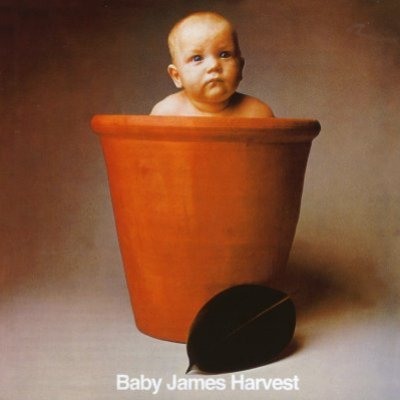 |
Crazy Over You Delph Town Morn Summer Soldier Thank You One Hundred Thousand Smiles Out Moonwater Child Of Man* I'm Over You* When the City Sleeps* (as BOMBADIL) Breathless* (as BOMBADIL) Thank You (Alternative version)** Medicine Man (Single version)* Rock and Roll Woman* The Joker* Child of Man (BBC session 15/03/72)** Moonwater (2002 remix)** * Indicates CD bonus tracks ** Indicates previously unreleased tracks |
1972 brought pressure from EMI to make a hit, so the lads went into Strawberry Studios and cut I'm Over You and Child Of Man. The former is a pleasant little tune with a commercial leaning, and is a sign of what's to come, little bits of Mellotron strings and even a smidgeon of Moog for the first time, but too much repetition of the song's title for me. The B-side was previously heard on the good old Beeb in March. Both versions are here for your listening pleasure. It's actually quite good with a faint hint of psychedelia. Needless to say, the single didn't chart!
In July the fearsome foursome and their orchestra played at The Tower of London, and plans were afoot for a new album. It was going to be a double LP, with a side for each of them, called Four Winds. But, alack and alas, not enough time and, more importantly, not enough dosh. Extensive touring with an orchestra hadn't left a lot in the band's coffers, so quickly back into the studio they went.
Woolly went to Abbey Road to create Moonwater and a masterpiece it is too. Almost totally orchestral with Woolly singing, this truly is Woolly's finest hour. Hints of Elgar and Mahler, but who gives a toss! It's superb! The 2002 remix on this CD is even better.
But time was running out so John, Les and Mel carried on working in Strawberry to finish the album before the next tour. (Woolly did overdub his parts at a later date.) Crazy (Over You), is carefully arranged with some nice lead-work from John. Les plays Mellotron but not much. Delph Town Morn is next up with an almost CS&N intro. But then something happens. Somehow, the Syd Lawrence Orchestra got into the studio and added a big band brass arrangement to it! Funnily enough, it works. Not yer typical BJH sound but quite good really.
Summer Soldier, a live favourite, is next. This 10½ minute opus begins with the sound of Big Ben and some kind of terrorist action going on in the streets of Westminster. Some martial drumming fades into some nice acoustic strumming with John singing about war again. This continues for a while, gradually getting heavier, until it almost becomes a different song with loads of Mellotron strings.
Thank You was a last minute addition to the album. A jolly little piece of BJH rock'n'roll that, lyrically, is a list of all those people who helped the band. It was remixed for single release, which appears on this CD, but EMI opted for the album mix instead. Incidentally, the B-side of that single is also here. Medicine Man, the single version, is so different from the original album version. It should have been the A-side and it should have been a hit!
One Hundred Thousand Smiles Out is a poignant song about being lost in space. No Mellotron here I'm afraid. And of course the album finishes with Moonwater which we've already discussed.
The album was released in November 1972, but in September EMI released a budget compilation called Early Morning Onwards. Harvest also released at about this time a single by a band called BOMBADIL. The A-side, Breathless, is a glam-rock instrumental that fuses Marc Bolan with Popcorn. It sounds like Lieutenant Pigeon with a Mini-Moog and is totally out of place on a BJH album. The flip-side, When The City Sleeps is more like it. Woolly sings and plays Mellotron strings on a song that reminds me of Genesis' A Trick Of The Tail. The single didn't chart and thank fuck for that!
After a tour of South Africa, loads of dates in the UK and an ill Woolly, BJH did a BBC Radio One In Concert in November. (See below).
As pressure from EMI/Harvest increased for some hit material, relations became strained between the band with their management and the record label. Dates with the orchestra were being cancelled because EMI weren't backing them. Another desperate bid for a hit was made with the release of Rock And Roll Woman b/w The Joker. Now I don't know about you, but I never put the word 'and' between rock'n'roll. It seems a bit naff, and so does the song. It's just not BJH. If they'd put some cellos on it, it could have been ELO. Likewise, the B-side is also not BJH. A strange cocktail of ELO, The Who and a school-choir, it's forgettable.
EMI re-issued Early Morning Onwards again (!) with a different sleeve but things took a turn for the worse when EMI, because of the lack of hot chart action, dropped the band. With no label and no management (they'd had enough as well!), the band played their last orchestral gig in Croydon on June 3rd 1973. John Lees' solo album, A Major Fancy, was recorded in 1972/1973 but didn't see the light of day until 1977 because of EMI's lack of faith and commitment. Well, at least they've made up for it by re-issuing the first four Barclay James Harvest albums with a veritable cornucopia of bonus material. Three cheers for EMI... Pardon?
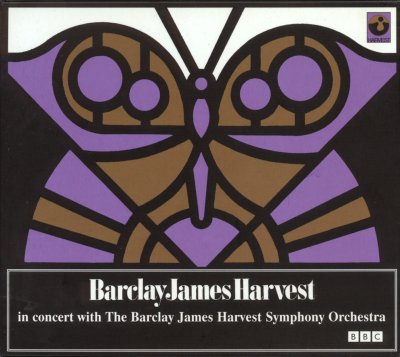 |
CD1 Mocking Bird Medicine Man Galadriel Summer Soldier The Poet After the Day Moonwater Dark Now My Sky |
EMI have unearthed and released as a double CD in a slipcase, the only live recording of BJH with an orchestra. Recorded at The Paris Theatre in London on November 16th 1972 and conducted by Martyn Ford, Woolly has described this show as 'beautiful chaos' due to the lack of space on stage for the band and all the other bodies that made up the BJH orchestra. As a result the sound balance is a bit iffy here and there, but the sheer power of the performances is magnificent. I've only given the track-listing for CD1 because CD2 is the same show but in a slightly different order. CD1 is, supposedly, the original Radio One broadcast in MONO, whilst CD2 is a STEREO recording made specifically for the BBC Transcription Service for distribution to other radio stations throughout the world. The versions of each song are similar to the original album versions that we all know and love, but with that added edge of a live scenario. Yes, the sound is rough in places and it is hard to distinguish what's going on the mix but this is an historical recording, so buy and enjoy.
So there you have it. That's the story of Barclay James Harvest and their association with one of the UK's most important progressive record labels. The band found new management in January 1974, which led to a deal with Polydor. But unfortunately, like a lot of those progressive bands of the late 60's and early 70's, record company pressure for commerciality and 'hot chart action' has led to a lessening of progressiveness. Take ELP, Yes, Gentle Giant and a myriad of others. They made groundbreaking albums in their early years but then as their style of music and inventiveness was less tolerated, they were forced into blandness and became boring.
In the case of BJH, the Polydor debut, Everyone is Everybody Else and the double Live LP are very good albums, but you can hear a change in direction. And this progressed with successive albums such as Time Honoured Ghosts, Octoberon and Gone to Earth. In fact, I gave up on them after Gone to Earth even though they are still going strong in one form or another.
See: Barclay James Harvest | Woolly Wolstenholme | Maestoso | John Lees